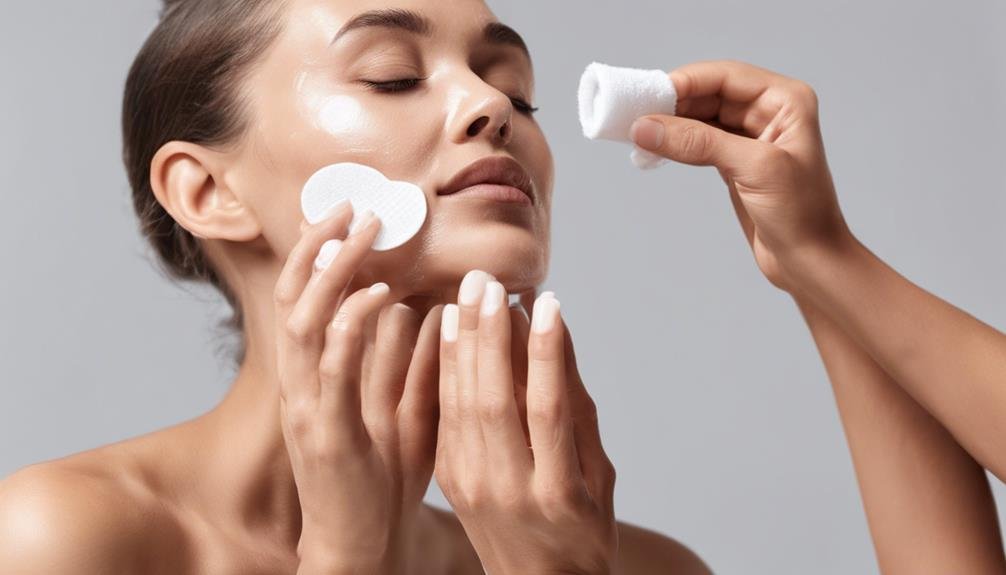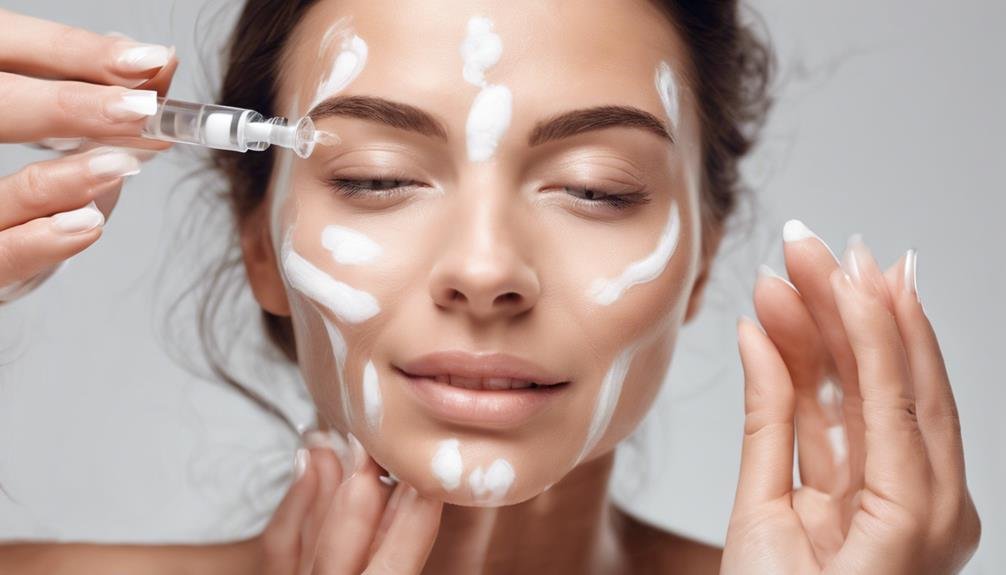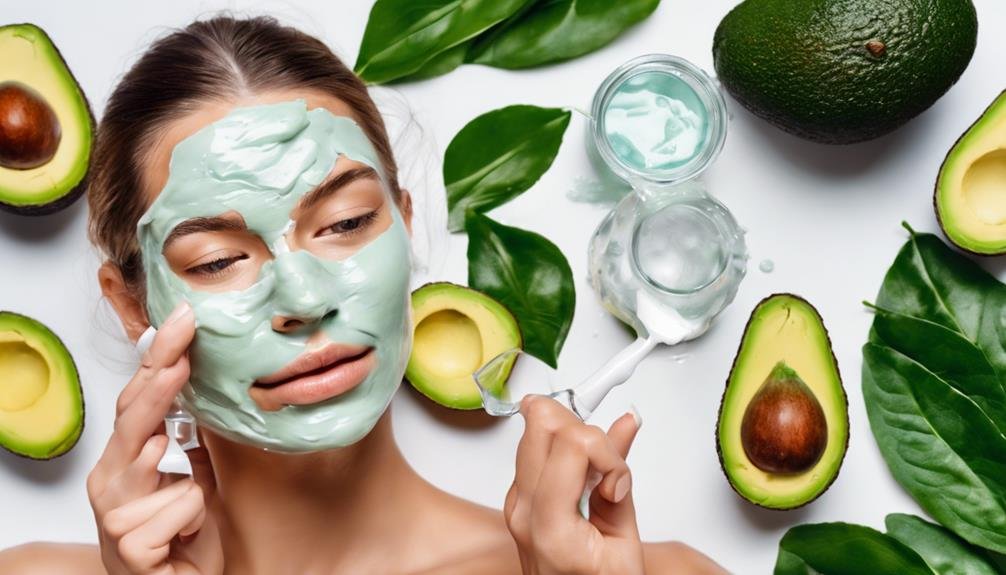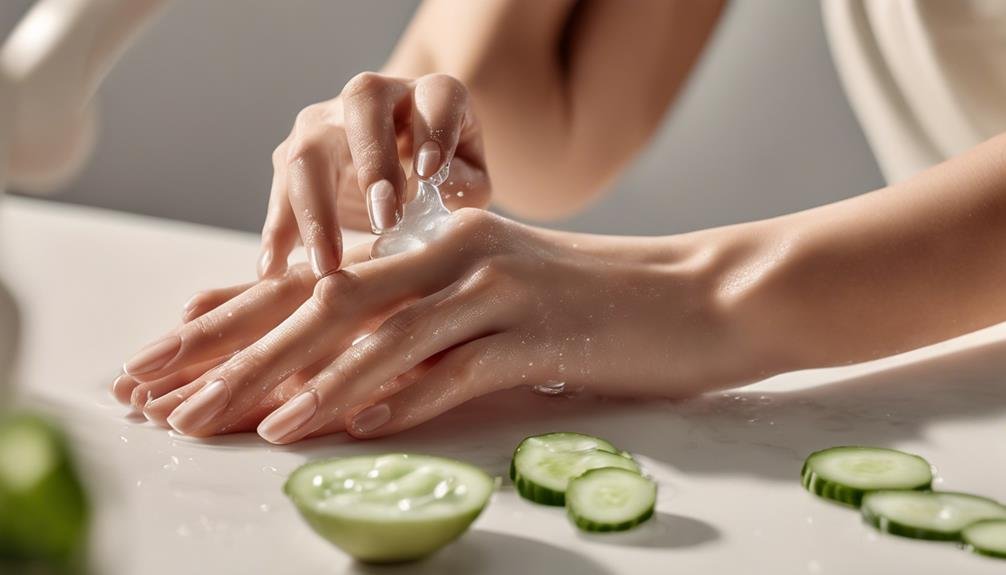To achieve a radiant complexion, ensuring your skin stays adequately hydrated is paramount. But what if your current skincare routine isn't cutting it? Discover simple yet effective tips tailored specifically for dry skin that can transform your skin's moisture levels and overall health. From the products you use to the techniques you employ, each step plays a crucial role in achieving that coveted dewy glow. Stay tuned to uncover the secrets to well-hydrated, supple skin that will have you glowing from within.
Key Takeaways
- Choose hydrating products with hyaluronic acid, glycerin, and ceramides.
- Use gentle cleansing techniques to maintain the skin barrier.
- Apply hydrating toner with ingredients like hyaluronic acid and glycerin.
- Opt for moisturizers specifically for dry skin, avoiding alcohol and fragrances.
- Incorporate facial oils for deep hydration and skin nourishment.
Importance of Hydration
Hydration is the cornerstone of a healthy skincare routine, essential for maintaining the wellbeing of your skin. When your skin lacks proper hydration, it can lead to dryness, flakiness, and an overall dull complexion.
The outermost layer of your skin, known as the stratum corneum, is made up of skin cells held together by lipids. These lipids help to retain moisture and protect your skin from external stressors. However, without sufficient hydration, this protective barrier can become compromised, leading to a variety of skin issues.
To combat dry skin and maintain a healthy complexion, it's crucial to incorporate hydrating skincare products into your daily routine. Look for products containing ingredients like hyaluronic acid, glycerin, and ceramides, which help to attract and retain moisture in the skin. Additionally, drinking an adequate amount of water throughout the day is essential for keeping your skin hydrated from the inside out.
Gentle Cleansing Techniques
To maintain the health and balance of your skin, it's important to pay attention to how you cleanse. When you have dry skin, choosing gentle cleansing techniques is crucial to prevent further irritation and dehydration. Opt for mild, hydrating cleansers that are free of harsh chemicals and fragrances. Here are some tips for gentle cleansing techniques:
| Technique | Description | Benefits |
|---|---|---|
| Use lukewarm water | Avoid hot water that can strip your skin of natural oils. Instead, opt for lukewarm water for a gentle cleanse. | Helps maintain skin's natural hydration levels. |
| Pat dry, don't rub | After cleansing, gently pat your skin dry with a soft towel. Avoid rubbing, which can cause irritation. | Reduces friction on the skin, preventing dryness and sensitivity. |
| Avoid over-cleansing | Cleansing your face twice a day is sufficient. Over-cleansing can lead to stripping the skin of essential oils. | Helps maintain the skin's natural barrier and prevents excessive dryness. |
Hydrating Toner Application
When it comes to caring for dry skin, the application of a hydrating toner plays a significant role in replenishing moisture and restoring balance.
Hydrating toners are formulated to provide an extra layer of hydration after cleansing, preparing the skin to better absorb subsequent skincare products.
To apply a hydrating toner effectively, start by pouring a small amount onto a cotton pad or your fingertips. Gently pat the toner onto your face and neck, avoiding the eye area. This helps to hydrate and soothe the skin without stripping it of essential moisture.
Look for toners that contain ingredients like hyaluronic acid, glycerin, or ceramides, which are known for their hydrating properties.
Using a hydrating toner twice a day, after cleansing and before moisturizing, can help keep your skin hydrated and balanced. Remember, toners aren't meant to replace moisturizers but rather enhance their effectiveness by providing an extra boost of hydration.
Choosing the Right Moisturizer
Selecting the appropriate moisturizer for your dry skin is crucial in maintaining hydration and promoting skin health. When choosing a moisturizer, opt for products rich in hydrating ingredients like hyaluronic acid, glycerin, and ceramides. These components help lock in moisture and strengthen the skin's natural barrier.
Consider the following factors when selecting a moisturizer:
| Factor | Description |
|---|---|
| Skin Type | Choose a moisturizer specifically formulated for dry skin. |
| Ingredients to Avoid | Steer clear of products containing alcohol or artificial fragrances. |
| Texture Preference | Pick a texture that suits your preference, whether cream or gel-based. |
Incorporating Hyaluronic Acid
For optimal hydration and skin health, incorporating hyaluronic acid into your skincare routine can be beneficial for individuals with dry skin. Hyaluronic acid is a powerful humectant that attracts and retains moisture in the skin, helping to keep it hydrated and plump. This ingredient is naturally found in the skin but diminishes with age and environmental factors. By adding hyaluronic acid serums or moisturizers to your routine, you can replenish your skin's moisture levels and improve its overall hydration.
When choosing hyaluronic acid products, opt for formulations that also contain ingredients like glycerin and ceramides, which can enhance its hydrating effects. Incorporating hyaluronic acid into your daily skincare regimen, particularly after cleansing and toning, can help lock in moisture and create a supple, dewy complexion.
Remember to follow up with a moisturizer to seal in the hydration and maximize the benefits of hyaluronic acid for your dry skin.
Benefits of Facial Oils
To enhance the hydration and nourishment of your dry skin, incorporating facial oils into your skincare routine can provide numerous benefits. Facial oils are rich in fatty acids and antioxidants that help replenish the skin's natural lipid barrier, preventing moisture loss and promoting a supple complexion.
These oils, such as argan, jojoba, or rosehip oil, are easily absorbed by the skin, delivering deep hydration without clogging pores. They also contain vitamins and nutrients that can help soothe irritation, reduce inflammation, and improve overall skin health.
Additionally, facial oils create a protective layer on the skin's surface, shielding it from environmental stressors like pollution and harsh weather conditions. By incorporating facial oils into your daily regimen, you can achieve smoother, softer, and more radiant skin while combatting dryness and restoring your skin's natural balance.
Hydrating Face Masks
When it comes to enhancing hydration and revitalizing your skin, incorporating hydrating face masks into your skincare routine can be a game-changer.
Hydrating face masks are specially formulated to deliver intense moisture to dry skin, helping to restore its natural balance and radiance. These masks often contain ingredients like hyaluronic acid, glycerin, and ceramides, which are known for their ability to attract and retain moisture in the skin.
Using a hydrating face mask once or twice a week can provide an instant boost of hydration, leaving your skin feeling soft, smooth, and plump. To get the most out of your face mask, make sure to apply it to clean skin and leave it on for the recommended time. You can also enhance the mask's effectiveness by incorporating it into your nighttime routine, allowing your skin to absorb the hydrating ingredients while you sleep.
Incorporating hydrating face masks into your skincare regimen can help combat dryness, improve skin texture, and promote a healthy, glowing complexion.
Overnight Hydration Techniques
Enhancing your skin's hydration doesn't have to end with just face masks. Overnight hydration techniques can work wonders for dry skin. One effective method is incorporating a hydrating serum or oil into your nighttime skincare routine. These products are formulated to deeply penetrate your skin while you sleep, replenishing moisture and promoting a plump, radiant complexion come morning.
Consider using a humidifier in your bedroom to add moisture to the air, preventing your skin from drying out overnight. Additionally, opting for a thicker, richer moisturizer before bed can create a protective barrier that locks in hydration. Ingredients like hyaluronic acid, glycerin, and ceramides are excellent choices for boosting overnight hydration and repairing the skin's moisture barrier.
Don't forget about your lips and hands—applying a nourishing lip balm and hand cream before bedtime can help combat dryness in these areas. By incorporating these overnight hydration techniques into your skincare regimen, you can wake up to soft, supple skin that looks and feels rejuvenated.
Hydration From Within
For optimal skin hydration, it's essential to consider the role of hydration from within. Drinking an adequate amount of water daily is crucial for maintaining skin moisture levels. Water helps to hydrate your skin cells from the inside out, giving you that healthy and plump complexion you desire.
In addition to water, incorporating hydrating foods into your diet can also benefit your skin. Foods rich in omega-3 fatty acids, such as salmon and walnuts, can help improve skin hydration and strengthen the skin barrier.
Furthermore, herbal teas like green tea or chamomile tea can provide additional hydration while offering antioxidant benefits to protect your skin from damage. Limiting your intake of dehydrating beverages like alcohol and excessive caffeine can also help maintain your skin's hydration levels.
SPF Protection for Dry Skin
To effectively protect dry skin from harmful UV rays and environmental damage, incorporating SPF protection into your skincare routine is crucial. Sunscreen not only helps prevent sunburn but also plays a vital role in maintaining the health and appearance of your skin. Here are some important points to consider when choosing and using SPF protection for dry skin:
- Choose a Moisturizing SPF: Opt for a sunscreen that offers hydration along with sun protection to combat dryness.
- Apply Generously: Don't skimp on sunscreen; make sure to apply a sufficient amount to cover all exposed areas.
- Reapply Throughout the Day: Reapply sunscreen every two hours, especially if you're outdoors or engaging in activities that may cause sweating.
- Look for Broad-Spectrum Protection: Select a sunscreen that provides broad-spectrum protection to shield your skin from both UVA and UVB rays.
- Consider SPF-Infused Makeup: Incorporating SPF-infused makeup products can provide an additional layer of protection while keeping your skin hydrated.
Avoiding Harsh Ingredients
Selecting skincare products free of harsh ingredients is paramount in maintaining the health and balance of dry skin. Harsh ingredients like sulfates, alcohol, and synthetic fragrances can strip the skin of its natural oils, leading to further dryness and irritation.
When choosing skincare products, look for gentle, hydrating ingredients such as hyaluronic acid, glycerin, and ceramides. These ingredients help to replenish moisture and strengthen the skin's barrier, promoting a healthier complexion.
Avoid products containing alcohol, as it can be drying and irritating to dry skin. Additionally, steer clear of sulfates, which are harsh cleansing agents that can strip the skin of its natural oils. Fragrances, both synthetic and natural, can also be irritating to dry skin, so opt for fragrance-free products to minimize the risk of irritation.
Consistent Hydration Routine
Establishing a consistent hydration routine is key to effectively managing dry skin. To keep your skin adequately moisturized and healthy, follow these tips:
- Morning Hydration: Start your day with a hydrating cleanser to refresh your skin and prepare it for the day ahead.
- Hydrating Mists: Keep a hydrating mist handy throughout the day to provide quick bursts of moisture whenever your skin feels dry.
- Moisturize Regularly: Apply a rich moisturizer at least twice a day to lock in hydration and prevent moisture loss.
- Nighttime Nourishment: Before bed, use a hydrating serum or overnight mask to deeply nourish your skin while you sleep.
- Weekly Treatments: Treat your skin to a hydrating mask or facial oil at least once a week to give it an extra boost of hydration.
Frequently Asked Questions
Can I Use Hydrating Skincare Products if I Have Oily Skin?
Yes, you can use hydrating skincare products even if you have oily skin. Opt for oil-free, non-comedogenic formulas that provide lightweight hydration. Look for ingredients like hyaluronic acid or glycerin to hydrate without clogging pores, keeping your skin balanced.
How Often Should I Exfoliate Dry Skin?
To exfoliate dry skin effectively, aim for 1-3 times per week. Over-exfoliation can worsen dryness. Gentle exfoliation removes dead skin cells, allowing better product absorption. Remember, balance is key for healthy, glowing skin.
Is It Necessary to Use a Separate Eye Cream for Dry Skin?
You should use a separate eye cream for dry skin to provide targeted hydration and address specific concerns around the delicate eye area. Look for formulations with ingredients like hyaluronic acid and ceramides to help nourish and moisturize effectively.
Can I Apply Moisturizer Over Sunscreen for Dry Skin?
Sure, you can layer moisturizer over sunscreen for dry skin. Just ensure the sunscreen is fully absorbed first. Applying a broad-spectrum SPF moisturizer can provide hydration and sun protection, keeping your skin healthy and glowing.
What Is the Ideal Humidity Level for Hydrated Skin?
To maintain hydrated skin, aim for an indoor humidity level between 40-60%. This range helps prevent moisture loss and promotes skin hydration. Consider using a humidifier to achieve the ideal humidity level for your skin's health and comfort.
Conclusion
In conclusion, remember that hydrating skincare tips are essential for maintaining healthy and radiant skin, especially for those with dry skin. Just like a flower needs water to bloom, your skin requires hydration to thrive. By incorporating gentle cleansing techniques, hydrating toners, and the right moisturizers, you can achieve a well-rounded skincare routine that keeps your skin nourished and glowing. Stay hydrated inside and out, protect with SPF, and avoid harsh ingredients for optimal skin health.







